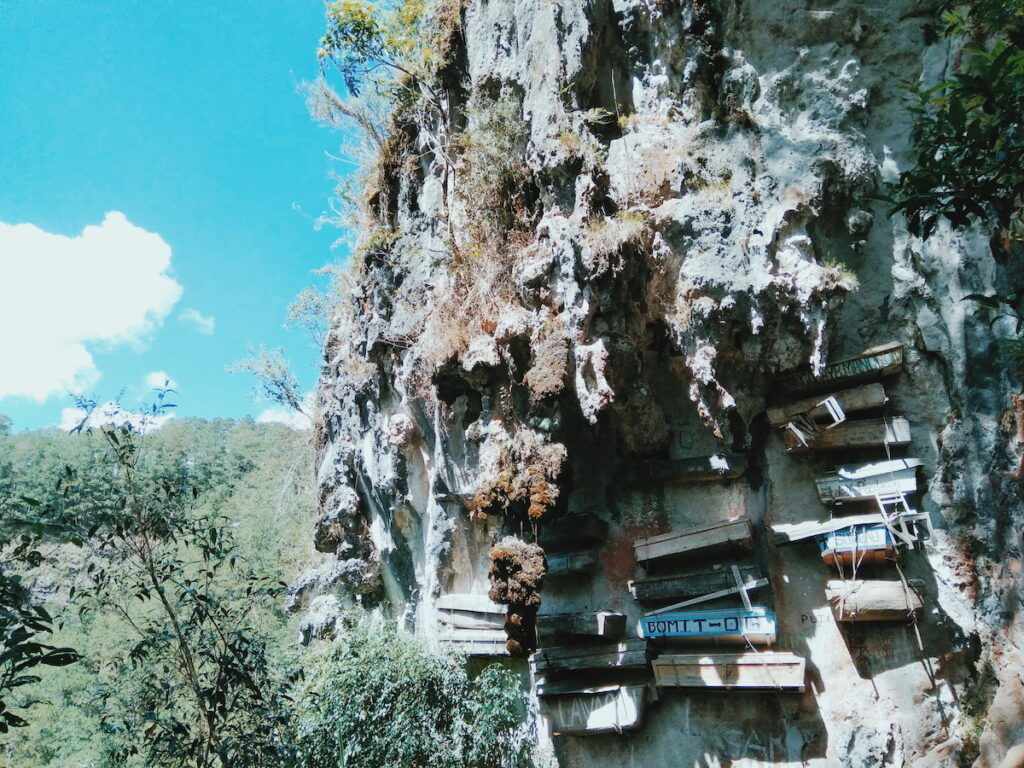Unique Cemetery: The Sagada Hanging Coffins in Mountain Province, Philippines
The Hanging Coffins of Sagada are definitely one of the most popular tourist spots in Mountain Province. Visiting this old-world burial site only involves a short hike but what makes it more interesting is that you will have to pass by an American-influenced cemetery on a hilltop called Echo Valley.

Trekking to the hilltop was a chilly and easy journey, but seeing a Globe Telecom Cell Site right at the back of the Calvary replica was rather disappointing. After just a short walk down to the Echo Valley, our disappointment was eased after seeing the magnificent view of Sagada’s rocky village and the jaw-dropping view of the Hanging Coffins.
Sagada Modern Cemetery
The path was not paved, and the soil was naturally sticky and slippery, so everyone decided not to continue the trek down to Hanging Coffin’s nearest viewpoint. Instead, everyone enjoyed shouting and cam-whoring from the viewpoint of the valley. The place was not called Echo Valley for nothing; it’s one of the few places in this world where shouting is allowed and apparently…. enjoyed.

I could not get a decent photo of the hanging coffins, but seeing them from afar was a totally different experience.

Sagada Death Rituals
Hanging coffins are coffins placed on Mountain cliffs as part of the Igorot indigenous culture and burial tradition of the Sagada People. It may not be unique to the Philippines since these old tradition is also being done in some parts of Indonesia and China, but this does not mean we don’t have a culture of our own.
Coffins are made of hollowed-out logs commonly carved by the elderly Igorots before they die; each cadaver was smoked throughout the 5-day pre-burial feast to avoid fast decomposition. Hanging the coffins on high elevated cliffs is traditional for burying a qualified individual. The indigenous death ritual also involves pushing the bodies into the tight spaces of the coffin to fit into the coffin space made from Pine tree logs.
This ancient practice in Sagada was already more than 2,000-year-old tradition. Although it was no longer a common practice for locals of Sagada, the latest addition to the hanging coffins of Sagada was placed there last June 2008.




The Igorot ancestors in Sagada believed that the higher your body is laid – the close they are to ‘heaven.’ Another reason was to protect the bodies from natural disasters like earthquakes and floods and keep the corpses away from wild animals.
How they settled the coffins in these high elevated cliffs was still a mystery for me; in this world of never-ending discovery and new technology, the old way of doing everything seems more appealing to me. The ancient way of burying the dead in Sagada has been slowly disappearing, but their descendants continue other traditions, and I believe the Igorot hospitality is part of it.


My Sagada experience was more than just a road trip and gastronomic adventure; it was also a short cultural immersion and a fantastic way to commune with nature. More than its mystique charm, Sagada’s best attraction is not the cold weather but its friendly people. Like the Ivatans of Batanes, Igorots of Mountain Province are one the friendliest people I’ve met during my travels.
How to Get To Sagada From Manila
Direct routes from Manila to Sagada are now available through the services of Coda Lines Corporation. The company offers a daily trip from the Cubao terminal to Sagada. The daily departure schedule is at 8 in the evening and an estimated travel time of 12 hours. Fares start at Php 760. Contact Mobile 0927 559 2197/ 0929 521 3229 for inquiries.
Also Read: Travel Guide: How to Get to Sagada from Metro Manila
Check out our complete list of recommended Hotels in Sagada via Agoda, or you may also see available Airbnb properties in the area.
Also read:

